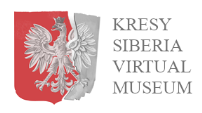About Us
The Kresy-Siberia Virtual Museum is presented by the Kresy-Siberia Foundation, headquartered in Poland and active throughout the world. Kresy-Siberia was started on 17 September 2001 by Stefan Wisniowski, the Australia-based, Polish-Canadian son of a Siberian deportee. It started as as an internet discussion forum, which has amassed 65,000 messages from over 1200 members and continues to this day.
Most of the early group members were the children of World War II Survivors of from Poland’s eastern Borderlands (“Kresy”) now living in the West. Upon reaching middle age, this Second Generation sought to understand what their elders had lived through. A good number of group members were Survivors themselves, providing a much needed “eye witness” view of the World War II fight for freedom and survival in eastern Poland and in forced exile.
It is important to note, and central to the Kresy-Siberia philosophy, that the group has always been multi-ethnic and multi-religious. Poland prior to World War II was a multicultural mix and our group has chosen to reflect this value. We pride ourselves on joining the younger and the older generations, Poles in the emigration with those in the country, and the citizens of Poland’s 2nd Republic (1919-1939) of all national and religious groups.
As time went on, our group undertook a number of specific aims. First and foremost the younger members (children and grandchildren) had to educate themselves about the Kresy provinces and the fate of their relatives. Both in the West and in Communist Poland, this aspect of the war was not taught, and in many families was not even discussed. As a result, few of the Second Generation even knew of their own family history.
Beyond that, group members began a search for archival information scattered in poorly accessible archives around the world as well as in the hands of the post-war Polish Diaspora themselves. We researched life in the Kresy prior to the war, the fate of its citizens during the war, and their destinies after the war. In time, the group amassed, digitized and downloaded thousands of photographs, documents and memoirs to its website, and formed close contacts with many of the Polish archives and museums around the world.
By 2008, our collection of websites began to reach capacity. Membership had grown to more than 700 in over 20 countries, and growth began to increase more rapidly as word of the group spread. A decision was made to create the Kresy-Siberia Foundation in order to organise our collections into a Virtual Museum and to take the organisation to the next level to better promote the world-wide co-ordination of the research and remembrance of the history of the Kresy and its peoples. The Foundation is registered as a charitable organization in Warsaw, Poland. Supporting branches of the Foundation exist in all corners of the world, such as in South Africa, Canada, Great Britain, the USA, Australia and New Zealand. Several of these are registered as charities in their local countries.
The Foundation is truly multi-lingual. Its many native English speakers of Polish heritage provide a most important focus on educating the Western world. Its growing group of native Polish-speakers furthers the important education and commemoration work of the Foundation in Poland itself. Our membership today includes not just the survivors and their children and grandchildren but also experts in Polish history, archivists and politicians.
At the core of the Foundation, the Kresy-Siberia Virtual Museum serves not only to preserve the group’s member collections, but also includes the collections and scholarly works of many individual historians, active research institutes and archives around the world. It provides an accessible window into this poorly known history and a base from which educational programs are being developed.
An important component of the Virtual Museum is the advice, support and endorsements it receives from key public figures. Its Honorary Patrons have included the late Ryszard Kaczorowski, the last president of the Polish Government-in-Exile; Bogdan Borusiewicz, Speaker of the Senate of Poland; Radoslaw Sikorski, Poland’s Minister for Foreign Affairs and now Speaker of the House of Parliament; and the late Janusz Krupski and now Jan Marek Ciechanowski, both Poland’s Ministers for Veterans Affairs. It has two honorary chaplains: Father Lucjan Królikowski, who personally brought a shipload of Polish orphans from Africa to freedom in Canada, and Michael Schudrich, the Chief Rabbi of Poland. Well known experts advising the exhibit development crew and ensuring the accuracy of the information presented, include “GULAG” author Anne Applebaum, historian Sir Martin Gilbert, and Professors Norman Davies, Janusz Cisek, Mieczyslaw Biskupski, Marek Jan Chodakiewicz, Tadeusz Piotrowski, Ewa Thompson and Piotr Stachura.
Many important institutions have also agreed to partner with the Kresy-Siberia Foundation and to share their collections. The Virtual Museum benefits from its collaboration with the Hoover Institution at Stanford USA, the Pilsudski Institute of New York, the Institute of National Remembrance in Warsaw, the Polish Institute and Sikorski Museum in London, the Memorial Society in Moscow, and organizations such as the Association of Borderland Settlers (Warsaw) and the Polish Combatants Association (England, Canada, Australia and New Zealand).
With the launch of the Kresy-Siberia Virtual Museum on the 70th Anniversary of the Soviet invasion of 17 September 1939, we marked the start of a new chapter in the history of the Kresy-Siberia Foundation. From this point we are in a building phase, collecting the testimonies and the memories of the remaining Survivors while they are still with us.
We need and welcome your support and your contributions, your time, your talents, and your financial support in order to complete this work that has become our passion – to honour the Polish citizens who so heroically struggled for freedom and for life itself in the eastern Borderlands and in exile outside their beloved Poland during the Second World War.

